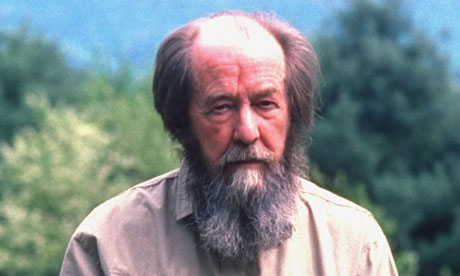
The pressure of history turned Aleksandr Solzhenitsyn into a prophet, a witness and a wonder, but it wasn't necessarily enough to turn him into an artist. Apricot Jam and Other Stories is a posthumous collection of rather hefty, lumpen chronicles written in the 1990s – I say "chronicles" rather than "stories" because there's so little sign of the ruthless shaping the short form requires. "Times of Crisis", for instance, is a 50-page biography of Marshal Zhukov that breaks through into the first person only to relapse into the third, as if the effort of identification couldn't be sustained. Any power here is a matter of relentlessness rather than vitality, with one detail among the hundreds finally making an impact.
No editor is given a credit, though the presence of Stephan Solzhenitsyn as co-translator (with Kenneth Lantz) points to his involvement. Perhaps it was Stephan rather than Aleksandr who decided that "Nastenka" was a single piece of work, rather than two stories written at different times (in 1993 and 1995) whose protagonists happen to share a name. The two women's experiences are very different, so that yoking them together is more of a distraction than a successful formal device. They're both ground down by the Soviet system, but that isn't enough to make them special. Their condition is general in a world gripped by ideology, which impartially degrades military discipline, sexual integrity, culture and family feeling.
There's a danger of desensitisation, for the reader as much as for the characters: "It was as if his nerve endings had grown numb, as if his vision, his sense of smell and his sense of touch had become less acute and would never be restored…" In a story such as "Ego", the nominal point of view is missing for pages on end from the account of mass sufferings. The personal narrative can't hope to animate such vistas of misery, any more than a butterfly net can conveniently pick up boulders. Some of these stories are set in the same period as Babel's Red Cavalry, and suffer very much from the comparison. In such dire circumstances, a savage sketch trumps a bleak panorama.
In a couple of stories, a contrast is established between life before and after the break-up of the Soviet Union. In the first section of "No Matter What", a conscientious company commander during the war (at the time of Stalingrad) reports some soldiers who have stolen some potatoes to cook in their quarters. In the second, a bureaucrat enjoys a trip on the Siberian river Angara while concerned parties try to lobby him about the fate of the river, whose ecological decline is clearly terminal.
Unfortunately this is the story in which the translation more or less implodes: "'Ye-e-es,' prolonged the commissar once more." Perhaps Kenneth was out of the room (or perhaps it was the other way round) when Stephan came up with the phrase "the day was as common as they come", and turned "his face didn't fit" into "he was not endowed with a mug that belonged here".
The irony of the story's two parts is thunderous but oddly indefinite. Are we supposed to understand that moral standards were higher in the past, or that despite the restricted opportunities for corruption human nature was no different? The company commander tries to take disciplinary action, but his superiors are more interested in eating the potatoes themselves.
There's a strange pair of stories with a second world war setting, reversed in chronological order, so that Russian forces have reached Germany in the first one, but are still on Soviet ground in the second. In " Zhelyabuga Village" the narrator is addressed with the author's own name, or its diminutive (Sasha), while in "Adlig Schwenkitten" there is no first person but instead a restless shifting between points of view.
Each potential centre of consciousness drags along behind it a back story as long and heavy as a goods train, yet none is more than meagrely characterised. One is simply "the saucy Yenko", and the description "lanky, imperturbable Siberian" counts as a reckless splash of colour. One of Sasha's fellow soldiers, "thin, agile Dugin" has made him some "lovely notebooks" for his war diaries, and perhaps these have provided the source material for the stories.
There is the potential for action-film suspense here, particularly in "Adlig Schwenkitten" (It was quiet – too damn quiet, as the poster might say), and the details of life in an instrumental reconnaissance battalion are striking and unfamiliar. Certainly human interaction is stripped down to the point of caricature: "They shook hands. Baluev thought he had a firm handshake, but Boyev had a grip of iron. They immediately established the easy relationship that was normal on the front line." The dialogue takes an orthodox turn – "'It seems to me that we're going too far off course, moving away from internationalism.' 'Why is that? Disbanding the Third International was quite correct.'"
Solzhenitsyn's own viewpoint becomes rosy and doctrinaire: "Who among us isn't simple and innocent at heart? Until the war, I had never rubbed shoulders with people like this. Thanks to the war, I came to know them and to be accepted by them." It all reads like the propaganda of the day, but without the required climax of heroism and self-sacrifice.
This is the oddest experience for readers of Apricot Jam – to find Solzhenitsyn, scourge of state power, producing something so nostalgic for ideology, so flatly modelled, so strangely Soviet.

